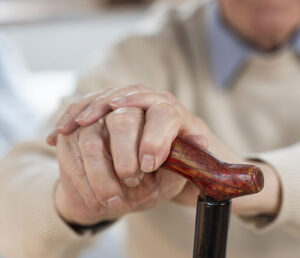This annual exemption is available for residential property that is occupied as the principal dwelling place of the owner, or a lessee; with a legal or equitable interest in the property; with a single-family residence; and who is liable for the payment of the property taxes on the leased property.
The amount of exemption is the increase in the current year’s equalized assessed value (EAV), above the 1977 EAV, up to a maximum of $6,000. The General Homestead Exemption may be granted automatically or may require an initial application to be filed with the chief county assessment office. For information and to apply contact the chief county assessment office.
Disabled Persons’ Homestead Exemption
This exemption is an annual $2,000 reduction in EAV of the primary residence that is owned and occupied by a disabled person who is liable for the payment of property taxes. Initial application Form PTAX 343 Application for Disabled Persons’ Homestead Exemption along with the required proof of disability must be filed with the chief county assessment office. The exemption must be renewed each year by filing Form PTAX 343-R, Annual Verification of Eligibility for Disabled Persons’ Homestead Exemption, with the Chief County Assessment Office. For a single tax year, the property cannot receive this exemption and the Disabled Veterans’ Homestead Exemption or Disabled Veterans’ Standard Homestead Exemption.
Disabled Veterans’ Homestead Exemption
Disabled Veterans’ Standard Homestead Exemption
This exemption is an annual reduction in EAV on the primary residence occupied by a qualified disabled veteran. The disabled veteran must own or lease a single family residence and be liable for the payment of the property taxes. The amount of the exemption depends on the percentage of the service-connected disability as certified by the U. S. Dept. of Veterans’ Affairs. A qualified disabled veteran with a disability of at least 50% to 69% will receive a $2,500 reduction in EAV, and a disabled veteran with a disability of at least 70% will receive a $5,000 reduction in EAV.
The initial application Form PTAX-342 Application for Disabled Veterans’ Standard Homestead Exemption must be filed with the chief county assessment office. The Form PTAX-342-R, Annual Verification of Eligibility for Disabled Veterans’ Standard Homestead Exemption must be filed each year to continue to receive the exemption. For a single tax year, the property cannot receive this exemption and the Disabled Persons’ Homestead Exemption or Disabled Veterans’ Homestead Exemption. For more information contact the chief county assessment office.
Homestead Improvement Exemption
This exemption is limited to the fair cash value that was added to the homestead property by a new improvement or the difference in an increase in assessed value between the prior structure and a rebuilt residential structure following a catastrophic event, up to an annual maximum of $75,000 Fair cash value (25,000 AV). The exemption continues for four years from the date the improvement is completed and occupied. The Homestead Improvement Exemption may be granted automatically or Form PTAX-323, Application for Homestead Improvement Exemption may be required by the chief county assessment office.
Natural Disaster Homestead Exemption
This exemption is on homestead property for a rebuilt residential structure following a natural disaster occurring in the taxable year 2012 (property taxes payable 2013) or any taxable year thereafter. The amount of the exemption is the reduction in EAV of the residence in the first taxable year for which the taxpayer applies for an exemption minus the EAV of the residence for the taxable year prior to the taxable year in which the natural disaster occurred. The exemption continues at the same amount until the taxable year in which the property is sold or transferred. The initial application Form PTAX-327, Application for Natural Disaster Homestead Exemption must be filed with the chief county assessment office no later than July 1 of the first taxable year after the residential structure is rebuilt or the filing date set by your county. The Form PTAX-327 must be filed each year to continue to receive the exemption.
Returning Veterans’ Homestead Exemption
The Returning Veterans’ Homestead Exemption (35 ILCS 200/15-167) provides a $5,000 reduction in the equalized assessed value (EAV) of the veteran’s principal residence for two consecutive assessment (tax) years, the tax year and the following year that the veteran returns from active duty in an armed conflict involving the armed forces of the United States. The veteran must own and occupy the property as his or her principal residence on January 1 of each assessment year. A veteran who acquires a principal residence after January 1 of the year he or she returns home is eligible for the RVHE on the principal residence owned and occupied on January 1 of the next tax year.
Note: For purposes of the exemption, “occupy” means your principal place of dwelling which is “the place where a person has his or her true, fixed permanent home and principal establishment, and to which, whenever he or she is absent, he or she has the intention of returning.”
Senior Citizens Assessment Freeze Homestead Exemption (SCAFHE)
This exemption allows senior citizens who have a total household maximum income of less than $55,000, and meet certain other qualifications to elect to maintain the equalized assessed value (EAV) of their homes at the base year EAV and prevent any increase in that value due to inflation. The amount of the exemption benefit is determined each year based on:
- the property’s current EAV minus the frozen base year value (the property’s prior year’s EAV for which the applicant first qualifies for the exemption), and
- the applicant’s total household maximum income limitation.
Each year applicants must file Form PTAX-340, Senior Citizens Assessment Freeze Homestead Exemption Application and Affidavit, with the chief county assessment office.
Senior Citizens Homestead Exemption
This annual exemption is available for residential property that is occupied as the principal residence of a person, who is 65 years of age or older during the assessment year. The person must be the owner; or have a leasehold interest in the property with a single-family residence; and be liable for the payment of the property taxes. The amount of the exemption is a $5,000 reduction in the EAV of the property. Filing requirements vary by county; some counties require an initial application, Form PTAX-324, Application for Senior Citizens Homestead Exemption, or an annual renewal application, Form PTAX-329, Certificate of Status – Senior Citizens Homestead Exemption, to be filed with the chief county assessment office.




